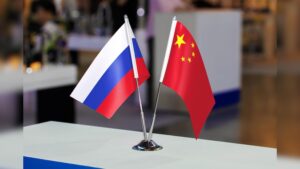A Strategic Partnership in the Crypto Space
China’s role in helping Russia navigate economic sanctions is becoming more pronounced, with the M-Bridge project, which uses central bank digital currencies (CBDCs), standing out as a key component. This collaboration allows Russia to circumvent the US dollar and avoid some of the impacts of Western sanctions. By leveraging CBDCs, both nations can continue trading while undermining the hegemony of the dollar in global reserves, which has already dropped to levels not seen in decades.

The M-Bridge project is part of a broader strategy to solidify this Eastern alliance. With Russia’s crypto mining industry thriving underground, particularly in regions like Dagestan, the relationship is clearly evolving. Local leaders acknowledge that these miners are finding creative ways to sidestep legal restrictions, showing how the crypto pact empowers Russia to continue its operations despite international pressure.
The US Response: Pressure on China
In light of these developments, the US government is stepping up its efforts to maintain its global influence. Recent sanctions on over 300 Chinese firms signal a continued attempt to pressure Beijing to back away from supporting Russia, but so far, China has remained steadfast. As part of its strategy, the US aims to block China from significantly aiding Russia’s defence sector, which includes its burgeoning cryptocurrency activities.
Frederick Kempe, CEO of the Atlantic Council, recently emphasized the dangers posed by this alliance at the United Nations General Assembly. He highlighted the growing concerns over China and Russia’s deepening ties and questioned whether US leadership can effectively counter this alliance, particularly in the lead-up to the November elections. With the stakes rising, this crypto pact has clearly caught the attention of policymakers and security experts worldwide.
Global Security Concerns
Former US Secretary of State Condoleezza Rice recently weighed in, stating that today’s geopolitical environment may be even more perilous than the Cold War. She voiced concerns about the rise of global threats, driven by a resurgence of populism, isolationism, and protectionism. These factors, combined with the China-Russia crypto pact, are fueling a sense of uncertainty and urgency among Western powers.

Russia, for its part, is also tightening regulations on its cryptocurrency sector. Starting November 1, 2024, new laws will govern the industry, and only approved companies will be allowed to mine crypto legally. This move suggests that the partnership with China will play a significant role in shaping these regulations, as Russia seeks to create a more stable and secure crypto environment amid rising tensions.
The Shift Towards Eastern Dominance
The China-Russia crypto pact is not just a challenge to US dominance—it’s a symbol of a broader shift in the global financial order. As cryptocurrency markets grow in importance, traditional power structures are being disrupted. While the US continues to push back, it remains unclear whether it can successfully maintain its position as the dominant global financial force.
Eastern dominance, particularly through innovative financial collaborations like the China-Russia pact, may well be on the horizon. As these nations strengthen their crypto ties, the world could witness a fundamental change in how money moves, with significant implications for global trade and political influence. The era of Western financial supremacy may soon give way to a new age, led by the East.
